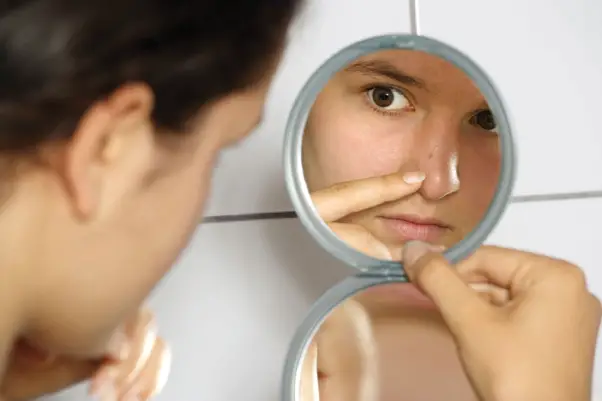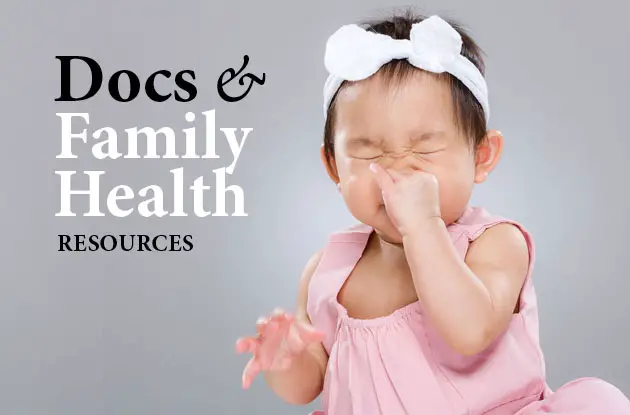Getting acne when going through puberty can impact a teen’s self-esteem. A local dermatologist discusses the different ways to treat acne, and a local psychologist discusses the psychological ramifications of acne and how you can help your teen’s self-esteem.

During adolescence, preteens and teens face a whirlwind of confusing and surprising physical, emotional, and social changes. But one physical aspect of that challenging time can have a big impact on emotional health: acne.
Acne is a part of growing up—“it heralds the onset of puberty,” says Kimberly Morel, M.D., an associate professor of clinical dermatology and clinical pediatrics at the College of Physicians & Surgeons at Columbia University. “It shows up right at the cusp of when puberty is about to start.”
Even though acne is a normal part of adolescence, its emotional toll can be devastating—and can lead to anxiety, psychological distress, depression, embarrassment, and low self-esteem, says Natalie Weder, M.D., a child and adolescent psychiatrist with the Child Mind Institute.
Puberty, Dr. Weder says, is “a time that kids are really scrutinizing themselves.” Most kids develop a sense of how they “should” look from society, the media, and their peers; the airbrushed models in girls’ magazines are slim and never have acne, for example. That’s where teens get their standards, Dr. Weder says.
Parental expectations can also play a major role in how adolescents see themselves. Teens and preteens can internalize their parents’ concerns about weight and appearance and apply unrealistic expectations to themselves.
Dr. Weder recommends parents explain to their children that images they see in the media are often retouched and altered to look “flawless.”
“Expose your child to different kinds of beauty,” she says. “Make them feel beautiful because of who they are.”
Before puberty, she says, parents should talk with their kids to prepare them for the changes that are coming, so they know what to expect.
Low self-esteem caused by acne isn’t just an emotional problem, of course: Dr. Weder recommends bringing your child to a pediatrician or dermatologist—a physical solution that can have a profound impact on his or her emotional well-being.
Treating Your Kids’ Acne
“I recommend treatment even when acne is mild, because even then it can leave marks,” Dr. Morel says. “Mild acne should be treated with simple measures like gentle cleansing.”
Dr. Morel recommends parents look for cleansers that contain certain active ingredients: Benzoyl peroxide and salicylic acid are two ways of controlling mild acne, she says.
Parents should watch out for products that can be misleading. “Don’t fall into the trap of using acne scrubs,” she says. “There are many products that are marketed that sound like they’d be good to treat your skin, but scrubs can be irritating and can cause more inflammation, so steer away from those.”
If acne is not controlled with over-the-counter medicated cleansers, Dr. Morel recommends parents see a medical professional. Your child’s pediatrician can often help manage mild to moderate acne, either with a topical antibiotic or a topical retinoid to treat the blackheads and whiteheads before they become more inflamed.
But sometimes those treatments won’t be enough. “They may need to see a dermatologist if their acne is not able to be controlled with topical care,” Dr. Morel says, and “they may need antibiotics by mouth in some cases.”
Dr. Morel says that when it comes to treating acne, patience is important. “Acne treatment does not work quickly—it takes several weeks,” she says, so don’t give up or step up treatment too quickly.
Some cases may be more severe, and may benefit from a stronger treatment such as isotretinoin, “a vitamin A analog that is very effective to help control severe acne,” according to Dr. Morel. “However, it also has a lot of significant side effects, so it’s not prescribed without careful consideration of the situation.”
There is another option for girls, she says: Certain birth control pills are FDA-approved to treat moderate to severe acne. These work largely by controlling androgen and other hormones involved with oil production in the skin.
There are some day-to-day lifestyle changes that may help to reduce acne, too—but some solutions you may have heard won’t necessarily make a difference.
“Everyone asks, ‘If I don’t eat chocolate, will it cure my acne?’—and the answer is probably no,” Dr. Morel says. One study has examined a possible link between drinking excess milk and acne, but “a moderate amount of milk should not affect your acne.”
Ongoing studies are also looking into the effects of a diet low in refined sugars. While a definite link between acne and refined sugars has not been proven, “certainly, we know [cutting back on them] is good for your health,” Dr. Morel says. “Researchers are looking into the effects.”
When it comes to showering, she says, “once a day is fine. Acne is not caused by dirty skin, so we want to be careful about over-scrubbing,” whether with a gentle cleansing or medicated acne wash.
Another important point of advice: “No picking,” Dr. Morel advises. “Popping pimples leaves more marks.”
And for girls who want to use a liquid cover-up, look for a product that says it won’t clog pores (“noncomedogenic” may be on the label)—and the same goes for sunscreen, which Dr. Morel recommends because the marks that acne leave become darker when exposed to the sun.
One last bit of advice: Get a full night’s sleep! One study has examined the correlation between a lack of sleep and an increase in acne flare-ups.
Acne is a normal part of growing up, but that doesn’t mean you should ignore it, Dr. Morel says. Even mild acne should be monitored and taken care of, either through gentle cleansing or, if that isn’t enough, the help of
a doctor.
Emotional Impacts of Acne
Even with treatment, acne will not necessarily go away overnight, and parents should watch out for signs that their kids may be depressed or anxious about their skin.
“The child might appear more withdrawn, irritable,” Dr. Weder says, and “might not want to go out as much.” Watch out for any indication that your child might be sad or embarrassed; for example, your child “might comment a lot on how they look,” she says, or they “might say that they’re not likable and not attractive.”
Dr. Weder recommends that parents try to “normalize” the situation for their children. Let them know that “a lot of kids have acne—it’s something a lot of people struggle with,” she says.
In some cases, taking your child to a professional therapist or psychiatrist may be necessary. “It’s a case-by-case basis,” Dr. Weder says. Talk to your
children; if they don’t seem to get better, then you should seek help.
Also see:
Tween Angst and How You Can Help



















